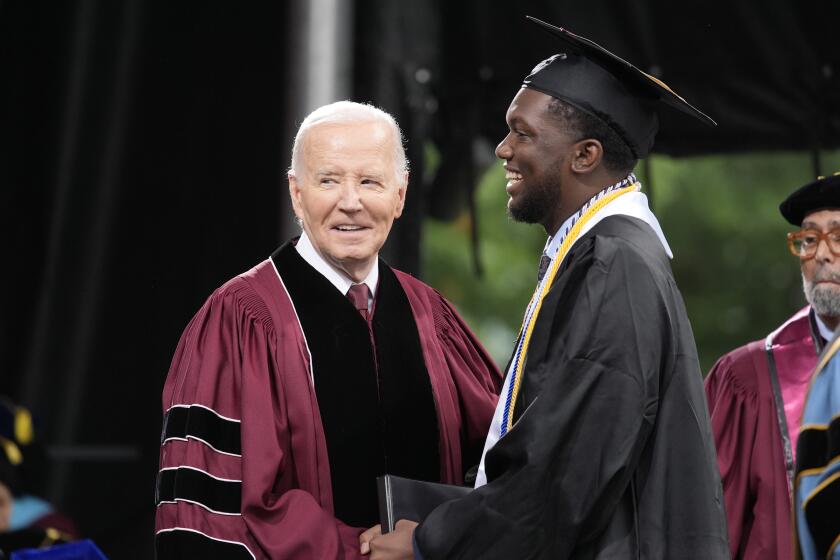O.C. Fund Invests in Young Latinos’ Future
They made it the hard way. Now a group of successful first- and second-generation Californians, many of whose parents fled poverty in Mexico, are giving back by helping poor but promising Latino students go to college.
Three years ago, these attorneys, educators, business owners and bankers met to create a scholarship fund and pledged to raise at least $1 million. The Hispanic Educational Endowment Fund, or HEEF, has already passed the half-million-dollar mark and has begun attracting the attention of major corporate donors.
The need has never been greater, organizers said, pointing to cuts in affirmative action programs at California universities and an apparent drop in tolerance for immigrants, particularly those from Mexico and Central America.
“There is so much negativity out there these days, it can be very discouraging for our young people,” said Frances Munoz, a Municipal Court judge in Newport Beach who sits on a 13-member advisory committee for HEEF. “I believe we have to find a way to offset that.”
Munoz knows from personal experience how difficult the quest for an education can be. The fourth-born of 11 children, she grew up in a poor and transient household headed by a Mexican immigrant who came to California to pick lemons and oranges. “I was the first one in my family to graduate from high school,” Munoz said with pride.
But it took another 12 years for her to finish college and law school, while working and helping to support the large family, and she said she doesn’t want other students to have to make the same sacrifice.
“I could not live with myself if I didn’t do something to help,” said Munoz, who also tutors elementary school students in Santa Ana. “If we don’t do it, who is going to? We’re talking about the future of our community.”
Munoz is typical of HEEF’s inner circle, a Who’s Who of rising Latino leaders in Orange County. Experienced at working within the system, they view education, and eventual economic success, as the key to gaining political clout.
“This is a community that has never enjoyed economic or political power equal to its numbers,” said Manuel Gomez, an advisory committee member whose father was a migrant farm worker with only a third-grade education. “We have to help each other to reach our potential.”
Like Munoz, Gomez was the first in his family to finish high school. He then attended college with a scholarship and went on to become vice chancellor for student services at UC Irvine.
Indeed, most of the fund’s organizers can think back to a scholarship or a mentor who helped them achieve success.
“In high school, I was just planning to go to a junior college,” said Ruben Smith, a Newport Beach attorney who was born near Guadalajara and moved frequently with his family across the western United States before settling in Huntington Beach. “I didn’t have much ambition. But a counselor took an interest in me. He told me, ‘You’re going to apply for these special programs and you’re going to a university.’ ”
Smith not only finished USC on a scholarship, but went on to Yale Law School. “Had the doors not been open to me, who knows where I would have ended up,” said Smith, who co-chairs the fund with Frank Quevedo, a senior vice president at Southern California Edison. “I think a lot of us feel that way.”
The idea for a fund developed from meetings between Smith, Munoz and about half a dozen other Latinos who were concerned about the high dropout rates and low college attendance rates for Latino students.
It wasn’t the first such fund in the county: Manuel Esqueda, a retired banker, started a scholarship program for Latinos in 1952 that he called the Gemini Club. Esqueda, who was among the first donors for HEEF, said he has helped nearly 1,000 young people attend college with his $500 grants.
But the new fund’s goal of $1 million is by far more ambitious than Esqueda’s Gemini Club, and is a measure of the success of a new generation of Latinos in Orange County.
“There’s a new energy and a new sense of urgency about our future in this community as well as our role in shaping the future of Southern California,” said Msgr. Jaime Soto, the Hispanic affairs vicar for the Diocese of Orange. “Those challenges are what brought many of us to the table.”
The half-dozen founders decided they needed to prove the commitment of local Latinos before asking for help elsewhere. They started small, and raised $100,000 from individual donors in the Latino community. Then, a few corporate donors, including the Spanish-language media conglomerate Univision and Southern California Edison, joined the fund. Within the past year, other major corporations such as Disneyland and McDonalds have contributed.
Full-scale grants won’t be handed out until the endowment is fully funded and generating about $100,000 a year in interest, said Smith. Details of how scholarships will be awarded have yet to be worked out, but Soto said the guidelines will be flexible and may be used for junior colleges and trade schools as well as universities.
There are also three separate sub-funds, for elementary school students, law students and business students, that fall under the umbrella of HEEF, which itself is run under the auspices of the Orange County Community Foundation, a nonprofit group formed in 1989 to support social, educational, scientific and cultural programs in the county.
Currently, several $1,000 grants are awarded each year to law students through the Wally Davis Fund, and grants for private elementary school education are given through the Luevano Fund, both of which existed before the creation of HEEF. A scholarship fund for business students is now being developed by the Hispanic Chamber of Commerce.
Although the main HEEF fund will be untouched until the $1-million goal is reached, it does award 12 college scholarships of $500 each annually out of donations earmarked for that purpose. They are given to high school juniors chosen from a countywide pool.
In granting the 12 scholarships, leadership skills, community service and need are equally weighted with scholastic achievement, Munoz said.
Among last year’s recipients was Israel Estrada, whose 3.71 grade-point average at Santa Ana High School was impressive but not high enough to qualify him for most scholarships.
Born in California but raised in the Mexican resort town of Mazatlan, Estrada came north to study three years ago when he turned 15, knowing no English and having little knowledge of American culture.
Despite his initial trouble with the language, Estrada excelled at mathematics and English composition, and also sang in the choir, co-edited the school’s literary magazine, tutored younger students and volunteered with the Parent-Teacher-Student Assn.
While most native Spanish speakers he knew dropped out of school, Estrada beat the odds by sticking with his studies. Still, he was intimidated by the scholarship application forms he found in the school counseling office.
“Here I was competing with all the cheerleaders and the football players, the most popular, straight-A students, what I call the high society of high school. I thought I didn’t have a chance,” said Estrada, sitting at a kitchen table in the small rented house he shares with his mother and sister, along with an aunt and her family.
The HEEF award gave him confidence to try for other grants, Estrada said. “It opened my mind to see I was capable of competing with people I thought were at a higher level. Since then, I’ve been applying for every scholarship I can get my hands on.”
Yadira Moreno, a senior at Anaheim High School, concurred. “You think of scholarships and think of everybody getting them but you,” said Moreno, the daughter of immigrants from Mexico who serves as student body president and also plays basketball, volleyball and softball for the school. “This one motivated me to apply for more.”
Lisseth Gonzalez, a senior at Valley High School in Santa Ana who hopes to attend USC next year, said the HEEF award boosted her confidence.
“Sometimes you get discriminated against because of your own background,” said Gonzalez, who plays in her school’s marching band, serves on the student council and works part time to help out her family. “But I don’t let that get in the way because I know where I come from and what my values are and what I want to do. When they gave me that award, they reinforced the way I was feeling.”
More to Read
Start your day right
Sign up for Essential California for news, features and recommendations from the L.A. Times and beyond in your inbox six days a week.
You may occasionally receive promotional content from the Los Angeles Times.






